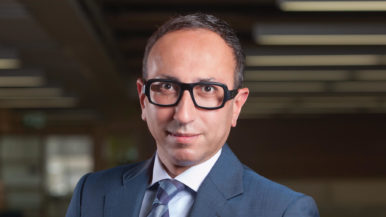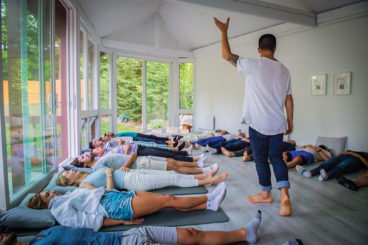
The Death Cheaters
The members of Longevity House are united by two things: a willingness to hand over $100,000 and a burning desire to live forever. Inside the weird world of cryotherapy, biocharging and fecal transplants
Last fall, a group of 30 people gathered at an Etobicoke estate to sample the latest in life-extension innovations. They sipped brain-boosting beverages laced with lion’s mane mushrooms and garnished with grapefruit, participated in a breathwork session and soaked up the electromagnetic pulses of the BioCharger, a $20,000 device that looks like a giant blender, sounds like a bionic mosquito and is purported to fight chronic disease, brain fog and flagging libido, among many other ailments. The evening was a soft launch for Longevity House, a private members’ club for Toronto’s burgeoning community of biohackers.
The price tag, $100,000 for a lifetime membership, was staggering. The promise, even more so: a chance to live longer, possibly to 120 years old. And not just longer but better, free from chronic illness and cognitive decline, by which standard six figures starts to sound like a bargain.
In the weeks that followed, word spread about the upstart’s hefty entry fee and astonishing 120-year claim, prompting mean tweets and guffaws at the elitism. All of it was predictable, according to Michael Nguyen, the man behind the venture. “There’s always going to be a certain amount of resistance when you’re leading the charge,” he says. Nguyen is not a doctor or health professional. He has no certifications in the wellness field, which he says is a good thing: “I come at all of this with a different lens. I can ask the right questions.”

Before launching Longevity House, Nguyen was best known as the haberdasher to Toronto’s one-percenters. His men’s tailoring company, Garrison Bespoke, created custom suits for Drake, Ryan Gosling, Jeff Bezos and most of the Raptors. If that career chapter was about making people look good on the surface, he says, Longevity House is about improving people’s lives “from the inside out.” In 2021, Nguyen purchased a $3-million, 7,500-square-foot mansion in Mimico and packed it with the latest in high-performance fitness equipment: alongside the BioCharger is a Tonal (the weightlifting system LeBron James uses), a Carol (an artificially intelligent exercise bike) and a Katalyst (an electronic muscle-stimulation garment that looks like a wetsuit and promises “the world’s most efficient workout”). There is also a red-light therapy room, a full-body vibration plate, a cold plunge tub and a custom-built sauna. Nguyen and his team have secured partnerships with in-demand health and wellness practitioners—naturopaths, breathwork specialists, a chakra guy, a therapist who specializes in psychedelics, and functional-medicine doctors who read blood and stool samples like physiological tea leaves.
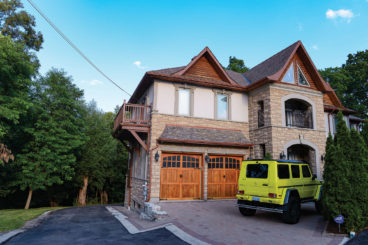
Biohacking—to “hack” one’s biology for the purposes of optimization—is wellness spiked with gadgetry. It’s New Age woo-woo with internet-age efficiency, Gwyneth Paltrow’s Goop but for tech bros. (As yet, Longevity House has no female members, and on more than one occasion, I heard Joe Rogan’s name spoken with reverence.) What is a biohack, exactly? That’s hard to pin down since the category covers pretty much any health intervention, from the obvious to the outlandish. Yoga is a biohack. So is wearing a Fitbit. So are probiotics and mood-enhancing supplements, forest bathing and looking deeply into another person’s eyes for a full minute. Also DIY experimental gene editing, fecal transplantation and uploading your consciousness onto an external server in the hopes of one day joining a race of cyborgs. (Elon Musk is working on it.) The common thread among biohackers is a mindset that views Mother Nature’s work as a starting point. Our bodies and minds are like early generation iPhones that can be optimized with frequent upgrades.
Another hallmark is an anarchist spirit. Many biohackers are keen to test unproven remedies on themselves—a way to snip through the red tape of the conventional medical-review and scientific process. At Longevity House, there is talk of “decentralizing” health care the same way the crypto community wants to decentralize our financial systems. “The patient is the doctor of the future,” Nguyen told me more than once, quoting a popular biohacking maxim.
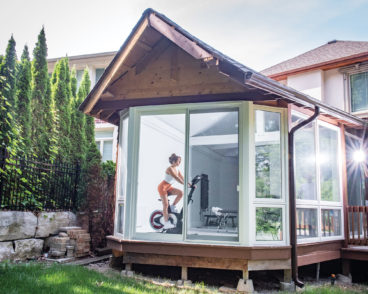
Nguyen has been biohacking for the past decade, though he isn’t wild about using the b-word. He says it’s too often associated with the sensational, sci-fi aspects of the lifestyle. He gets why, on the surface, Longevity House may sound like a Handmaid’s Tale spinoff—an exclusive society that grants eternal life to the uber-rich—but he insists that what he’s offering is evidence-based and within Health Canada guidelines. The possibilities, he believes, are endless, from both a health and a business perspective. And, while he can get a little starry-eyed from time to time, he is definitely tapping into something. A recent report from the consulting firm McKinsey and Company projected that biohacking could be a $1.3-trillion industry within the next two decades. Already, here in Toronto, cryotherapy (exposing oneself to subzero temperatures) is quickly becoming the new CrossFit, and stem-cell therapy clinics are popping up faster than old-timey barbershops. Every morning since the start of the pandemic, dozens of cold-water plungers have braved the icy waters of Lake Ontario, and they credit the practice with benefits including mood enhancement, weight loss and a boosted immune system. Extreme temperatures are huge in the biohacking universe, both as a cure for bodily ailments like inflammation and as a good way to build mental and physical resilience through hormetic stress, which is the good kind of stress that we aren’t getting enough of in our convenient, sedentary, screen-timey modern existence. The science is slippery, but few would dispute that getting outside and going for a swim is a healthier choice than more Netflix, Uber Eats and Wordle.
Biohacking was a thing before the pandemic, but the movement has expanded considerably since, spurred by a growing interest in alternative medicine and ever-increasing frustration with the current medical system. The spread of health-based and political conspiracy theories on social media has been a potent biohacking recruitment tool. So has the sense of powerlessness that many have experienced over the course of the pandemic. Toss in the Trump factor, “alternative facts” and the rise of anti-expertise sentiment, and it’s not surprising that a subculture promising miracle cures and an alternative to that crook Dr. Fauci is moving into the mainstream.
But the overall trajectory of the movement is worrying. Warning sirens wail like an overactive BioCharger, and during my first interview with Nguyen, I lay out my skepticism off the jump: I worry that profit motive and medicine don’t (and shouldn’t) mix; I wonder if “decentralization” isn’t just code for transferring power from one flawed institution to another; I’m reasonably confident that there is no such thing as a chakra.
Nguyen is used to the naysayers—history is littered with them. “We’re operating outside the norms of society, which can make people nervous,” he says. And that’s true, isn’t it? Don’t all breakthroughs start off as someone’s outlandish idea? Wasn’t Galileo convicted of heresy for his audacious insistence that the Earth orbits the sun? Isn’t it possible that my staunch allegiance to science will leave me on my deathbed while the biohackers skateboard into the next century? Nguyen is a charming and passionate hype man. But is he a modern Galileo or just a guy cashing in on the latest craze?
The quest to cheat death has existed almost as long as life itself. In the Middle Ages, alchemists set out in search of the Philosopher’s Stone, which promised eternal life to whoever found it. In the 16th century, members of the French nobility drank liquid gold to preserve their youthful glow. Pope Innocent VIII was so keen to turn back the clock that he had himself injected with the blood of children. Bonkers, right? But it’s also the basis for a modern biohack known as “young blood transfusion,” where an older individual is injected intravenously with the plasma of a younger donor. The procedure was performed in private clinics in the US for $10,000 up until 2019, when the FDA clamped down on what it called an unproven and unsafe practice perpetrated by “unscrupulous actors.” To be fair, researchers at Stanford and Berkeley are studying the potential impact that young blood could have on conditions like Alzheimer’s and Parkinson’s. The blood of younger mice has been shown, in small-scale experiments, to have rejuvenating effects on the muscle, brain and liver functions of older rodents. But any practical, mainstream application is way out. For now, the only thing being sold is false hope, which is not just unscrupulous but also an exploitation of distressing medical realities.
And there are many. As of 2020, the average Canadian will spend more than a decade dealing with poor physical and mental health. Biohackers use the term “healthspan” (as opposed to “lifespan”) to describe the period when one is not just alive but physically and mentally fit. The medical system, they argue, is reactive (designed to address problems after they arise) rather than preventative, which is true, due largely to a lack of political will, time and money.
Of course, cash is no object for the uber-rich. Over the past few years, the same tech execs racing one another into space have poured billions into this particular branch of biotech. Elon Musk has spent hundreds of millions of dollars on a cyborg project called Neuralink. Paypal founder Peter Thiel pledged $3.5 million (US) to the Methuselah Foundation, a non-profit that has vowed to make 90 the new 50 by 2030. Former Google Ventures CEO Bill Maris launched Calico (an abbreviation of California Life Company), a project focused on solving death. Jeff Bezos has reportedly invested in Altos Labs, a company that plans to rejuvenate cells in order to reverse disease. Twitter CEO Jack Dorsey is more of a lead-by-example kind of guy, meditating twice daily and walking eight kilometres to his company’s headquarters. He drinks salt water, works at a standing desk near an infrared bulb and practises intermittent fasting, including no food on weekends. The New York Times called Dorsey the Gwyneth Paltrow of Silicon Valley. He has also been criticized for glamorizing what most health professionals see as dangerous and disordered dieting practices. A more typical biohacker is the guy in your office who replaced his cocaine and Redbull habit with a high-fat diet and an Oura Ring (to track sleep, heart rate, diet and movement). He takes his coffee with butter, has been “so focused” since he started microdosing and probably has some strong opinions about government overreach. Biohackers believe in the N-of-1 approach to clinical testing, where efficacy is measured by the experience of a single patient. What this methodology lacks in robustness, it makes up for in efficiency. Who needs double-blind, randomized, peer-reviewed proof of concept? The proof, they would argue, is in the Keto coconut milk pudding.
“What are we feeling this morning? Energy? Mental clarity? Chakra balancing?” I am sitting with Nguyen in front of a BioCharger perched on a low-slung marble coffee table. I explain that I’m a little outside of my element, but let’s try energy, sure. Because who doesn’t need more of that these days?

Introduced to market in 2018, the BioCharger earned some unwanted publicity when Australian celebrity chef Pete Evans claimed it could cure Covid-19 in the early, desperate days of the pandemic. The result, for Evans, was a $25,000 fine from the Therapeutic Goods Administration, a regulating body in Australia. Still, the contraption has a devoted following, including wellness tycoon Tony Robbins; his wife, Sage; and pro surfer John John Florence (all of whom are paid sponsors for the product). Elle Macpherson says regular BioCharging sessions have helped her maintain her body (a.k.a. The Body). And Instagram is lousy with Spandex-clad yoginis doing their daily practice with a familiar status gadget in the frame.
Nguyen presses a few buttons and the light show begins. You don’t need to plug in or strap on anything, just sit close by and let the electromagnetics do their thing. Later, he says that my 10-minute session had the same benefits as spending an hour in direct sunlight, an activity I have always understood to be ill-advised (see: skin cancer). But, in the biohacking universe, the sun provides a natural charge for the body—the kind we’re not getting enough of with so much time spent indoors and on devices.
Embracing the natural environment is both a sacred bio-hacking tenet and, at Longevity House, a design directive. From the outside, the building looks like a typical suburban mansion: three storeys, five bedrooms, and a crescent driveway that, on the day of my first visit, is home to Nguyen’s electric-yellow Mercedes Benz G-Wagon. On the inside, the headquarters is all smooth edges and earth tones: creamy, shaggy carpets and blond wood accents, ambient art and waxy succulents. Along with the gym equipment, there is a kitchen and tables where members can work. While I’m there, CFL linebacker Henoc Muamba is on his laptop before a workout. He is a Longevity House ambassador, as is Donovan Bailey, who signed on after visiting the facility for a full genomic testing workup last spring. At one point, Nguyen mentioned something about Shawn Mendes, but when I followed up, he said that conversation had stalled. My request to see a membership roster was denied for privacy reasons. “There are a lot of people who are a bit sheepish about what we do here,” Nguyen says, “I think because it seems like a rich guy’s endeavour.” Which, of course, it is. Instead of doing the big steak dinner at Barberian’s, drinking too much red wine and waking up with a hangover, Nguyen tells me, people are coming here. Last spring, Peter Tolias, a founding member who is also a Conservative party fundraiser, arrived at Longevity House on the heels of a celebration for Patrick Brown’s (ill-fated) entry into the party’s leadership race. Tolias and others did a guided meditation led by Buddhist monk Bhante Saranpala, slurped smoothies and ate organic steak. An early spring blizzard didn’t stop them from hiking in the ravine, followed by a silent meditation, followed by a sauna session, followed by cold plunges and snow angels. (Yes, snow angels are a biohack.)
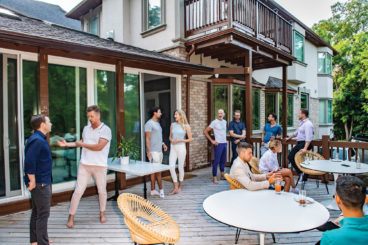
As of late July, Longevity House had filled 23 out of 30 founding membership spots, mostly with athletes and finance guys plus a couple of cannabis industry expats. The entrance fee is a buy-in to an investment fund targeting promising biotech start-ups in Canada. The first investment was in the Living Proof Institute, a functional-medicine clinic founded by a chiropractor named Sachin Patel, who describes himself as a “keeper of truth” and a “warrior of light.” The idea is bespoke health care: millions of data points on everything from how your body processes food to how your brain manages stress.
If and when the Longevity House fund turns a profit, the company will take a two per cent management fee and split profits with investors 60-40. But Nguyen is not so concerned about the money piece. He made a killing in crypto, he explains. “I could take my money and go live my best life in Munich, but that wouldn’t be doing anything to help my family and my community,” he says. With its comparatively lax regulations, Munich is to biohackers as Graceland is to Elvis fans. Nguyen was there recently, looking into new stem cell therapies that are not legal in Canada. He has buddies who go biannually for youth blood transfusions and good beer.
For a guy who spends so much time in a masculine environment, Nguyen is the furthest thing from a bro. True, he drives a neon monster truck, but otherwise he has the mild manner and soothing monotone of a high school guidance counsellor. He is in his early 40s, though his biological age, he tells me, is between 27 and 29. He begins most mornings with a BioCharge and eats only one meal a day. He takes supplements including rapamycin, which has, he says, “been proven to reverse aging” (it has not) and a diabetes treatment taken by “one in four billionaires” (which I can neither prove nor disprove). He also gets platelet-rich plasma injections to reverse hair loss and occasionally naps in a hyperbaric chamber.
Nguyen is single but hopes to find a partner and would like to be a dad someday. He is extremely close to his own father, who is in the early stages of dementia. “I do everything I can to make sure his mind is staying active,” Nguyen says. “It’s kind of a joke that, if you invite me somewhere, there’s a good chance I’m going to show up with my dad.” When he is home in Toronto, Nguyen lives in a suite at the Ritz-Carlton. More often than not, though, he is globetrotting in Miami, visiting Tony Robbins’s new biohacking facility, Fountain Life; in London, for Wimbledon; in Costa Rica, on Longevity House business; in Greece, vacationing with his dad and sisters.
Nguyen came to Canada from Vietnam in the late ’70s with his parents and four siblings. His family lived in Dunnville, a small town outside of Hamilton that is also the skydiving capital of Ontario. His father worked in a Bick’s pickle factory that became a Smucker’s factory that is now a bone broth factory. His mother, who died of cancer when Nguyen was 17, was a dressmaker, and his paternal grandfather was a fabric merchant in Vietnam. Nguyen studied fashion design at George Brown after getting an accounting degree from York at his father’s insistence. He founded Garrison Bespoke in 2009. As well as outfitting a good chunk of high society, he created a $20,000 bulletproof suit in 2013—one that people actually bought. He was the creative force behind the Vogue-endorsed wardrobe on the TV show Hannibal, and he did the suits on Suits and outfitted the male lead, Gabriel Macht, for Meghan Markle’s wedding. (Maybe you heard about it.)
In 2015, Nguyen was looking to open a Garrison location in Florida, in partnership with his client and friend Michael Levine, a Bay Street financial advisor at the time. Then Levine was almost killed in an avalanche in Whistler, during which he was without oxygen for several minutes. He saw the best concussion specialists in the country but believes his recovery accelerated when he adopted a series of biohacks, including mindfulness coaching and regular sessions in a hyperbaric chamber.
A few years later, Nguyen’s sister Diem started experiencing a chronically itchy throat and shallow breath. He was worried—these were the same symptoms that his mom had experienced before her cancer diagnosis. In a panic, he sent Diem to private medical facilities, but nothing worked, and for once, his platinum Rolodex was useless. “If you want to plan some unusual party or trip, I can make it happen,” he says. “But this was something I couldn’t just throw money at.” In the end, it turned out that Diem just had a chronic case of acid reflux, but by the time they figured that out, Nguyen was hooked on biohacking and wanted to grow the community in his home city.
The business plan for Longevity House, he concedes, is still a work in progress and is very much contingent on successful community building. Buying a fancy mansion for a small group isn’t scalable or a great use of capital, he says. Instead, he is working on partnerships and licensing deals and developing a line of longevity supplements with his business partner and Longevity House co-founder, Markus Raty. Their first product, a gummy version of jiaogulan, the Chinese “immortality herb,” is scheduled to debut this fall.
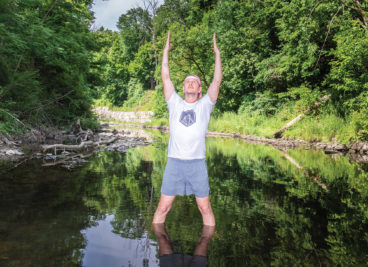
Raty is Longevity House’s chief operations officer, a rakish jack-of-all-trades type and the furthest thing from the self-serious, optimization-obsessed biohacker stereotype. He had never even heard the term when Nguyen first told him about his new project. It wouldn’t be an exaggeration to say that Raty loves saunas the way the Cookie Monster loves cookies. On a good week, he’s in there two, three hours a day—he credits his mental and physical health to this practice, which he has been taking more seriously. His motivation is two-pronged: he’s 47 with young kids and wants to be healthy and vibrant when they’re in their 20s; and, in 2020, he lost his brother to alcoholism during the Covid lockdowns, a tragedy he describes as a wake-up call. “It was like, whoa, we’re all susceptible to the vagaries of life.” He introduced Nguyen to Matt Hehn, who is now Longevity House’s chief people officer, which means he’s responsible for building the community. Very tall and stupidly handsome, Hehn is a guy who pulls off cool while using expressions like “good vibes float all boats.” Before he was a biohacker, he worked in luxury goods, including as the marketing director at Moët Hennessy—perpetual champagne flute between his fingers, the guy to know during TIFF. Then, in February 2020, he had an epiphany: being “that guy” was not making him that happy. A friend mentioned that he’d had a good experience with plant-based therapeutics, and weeks later, Hehn had taken time off work and flown to Costa Rica for back-to-back ayahuasca ceremonies followed by a Kambo ceremony, a ritual that involves smoking the poisonous secretions of a giant monkey frog, which biohackers call “the final purge.”
When I ask Nguyen about the amphibian venom trend, a topic recently covered in In Style magazine (“Why Are Celebrities Smoking Toad Venom?”), he says it’s probably not a good idea for me. Too intense. But, if I do want to try it, he can make introductions. That day, he is on call to accompany some members on an ayahuasca retreat at Rythmia, an all-inclusive resort-slash-life-enhancement-centre in Costa Rica. “The place that fixed Bobby Brown,” Nguyen tells me. (Is Bobby Brown fixed?) That same week, he will go with a different member to see a practitioner in Caledon who performs the aforementioned (and fully illegal in Canada) young blood transfusions. I ask about the risks and Nguyen says that, when the practitioner has more to lose than the patient, it’s pretty safe. By this, I assume he means that doctors performing experimental procedures have more to lose if things go wrong, which cannot be true. (Three people have died getting experimental fecal transplants, which are similarly unproven, at private clinics since 2020.) All Nguyen will say about the individual going to Caledon is that he’s a 43-year-old professional who has started to feel like he doesn’t have “the right energy” anymore and that his libido is in decline. Testosterone is a significant preoccupation of the mostly male biohacking community, literally—as in supplements and injections—but also metaphorically. In the darker corners of biohacking chat rooms lurks the idea that male physical dominance justifies man’s place at the top of the social order. “Reclaim your manhood” is a popular rallying cry.
When I broach these subjects with Nguyen, he says that he does not share the political views of some of his club’s members. He has seen evidence of toxic masculinity. (He once described a group of bankers who came in to do saunas and cold tubbing as “real #MeToo types.”) But he believes that even (and maybe especially) these troubled individuals can benefit from the experience Longevity House offers. Is Nguyen vaccinated? “No comment.” The vast majority of wealthy individuals he knows are not vaxxed. “I wish that wasn’t the case,” he says, which I take to mean that he is vaccinated and just wants to steer clear of the culture wars. Community is important, he says, but autonomy is even more so, going back to this idea that people need to become their own doctors. “That’s the ultimate goal.” But what if I want my doctor to be my doctor? I express my belief that people who say you can’t trust experts are often pushing their own agenda or being manipulated by someone else’s. Nguyen just seems to feel sorry for me, like I’m missing out on some essential truth—seeing a black-and-white photograph where he is seeing technicolour.
A few times over the course of our interactions, Nguyen asked if I might be interested in genomic testing for my infant daughter. He had a workup done for his five-year-old niece, and after her results showed the pre-markers for ADHD, she began to see a private tutor who works with her mom on specialized learning tactics. Having received an ADHD diagnosis in my late 30s, I can certainly see the appeal. But at least equally obvious are the pitfalls of this kind of cradle-to-grave streamlining. It’s hard to imagine that so much focus on the quest for perfection doesn’t create as many mental health problems as it solves. And, while I love the idea of feeling 50 at 90 as much as the next person, doesn’t it all feel a bit like virtuous, pseudoscientific window dressing laid over an age-old obsession with tight bodies and youth? Never mind the not-so-subtle shades of eugenics. When the goal is optimization, what happens to those of us who are, well, suboptimal? Who decides what “optimal” means, anyway? These are just some of the pertinent ethical questions surrounding the biohacking mission, most of which are predicated on the assumption that any of this stuff actually works. So, does it?
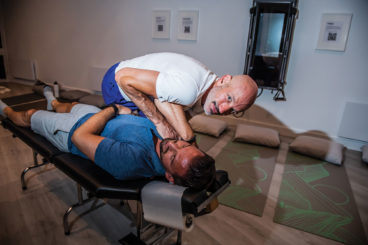
Well, in some ways, yes—but mostly no. And not in the ways or to the degrees that many biohackers believe it does. Tim Caulfield is the research director of the Health and Law Institute at the University of Alberta. In the spring of 2020, he received a $380,000 grant to combat Covid-19 misinformation, which he saw as a worthy academic pursuit and a public health emergency—people were drinking bleach, after all. He coined the term sciencesploitation to describe the practice of using valid science and scientific-sounding language to market unproven products and procedures, including stem cell therapies, probiotics and pretty much the entire field of functional medicine.
But what about pushing boundaries and challenging conventional wisdom? What about Galileo? It turns out that people use his name to bolster baloney on a regular basis. There’s even a term for it: the Galileo gambit fallacy. In a lot of cases, Caulfield adds, the research on what biohackers call “unproven therapies” has, in fact, been conducted: “We’ve run the clinical trials on stuff like platelet-rich plasma injections and it has been proven not to work, so this idea that ‘the science is promising’ is disingenuous.”
How genuine is Michael Nguyen? He certainly walks the walk, drinks the bone broth and bathes in the forest. He may actually have the cardiovascular system of a man half his age. But, ultimately, his heart is mainly entrepreneurial, and a business like Longevity House benefits from the blurring of credible science with all kinds of quackery.
Some of it is immediately treacherous (transplants, untested drugs) and some is dangerous in a more indirect way: cancer patients have died after delaying conventional treatment in favour of alternative remedies. The sun may be a natural source of vitamin D, but skin cancer rates are on the rise. So are eating disorders. And there’s almost certainly a person somewhere out there who bought a BioCharger to treat their Covid and suffered the consequences.
I looked long and hard for a single credible expert who would back the claims of the BioCharger but came up empty. When I challenge Nguyen on this point, he concedes that the machine probably doesn’t do anything that you can’t get from a daily journal practice or meditation. But people aren’t interested in those things, which are generally free and unsexy and don’t look good on social media, he says. I point out that this is essentially an admission that Longevity House is selling snake oil. Nguyen doesn’t see it that way. Remember, he could be off in Munich right now, getting jacked up on his own stem cells. Instead he is here, in Toronto, trying to remind everyone that our health is not a thing to take lightly. Mothers die young, fathers get old, pandemics come along to remind us how little is within our control. We are all susceptible to the vagaries of life. “I don’t care if people think I’m crazy,” Nguyen says. “If what I’m doing makes anyone care about their health before they get sick versus caring about a new sports car or a $300 dinner, then I’m doing my job.”
This story appears in the September 2022 issue of Toronto Life magazine. To subscribe for just $39.99 a year, click here. To purchase single issues, click here.
